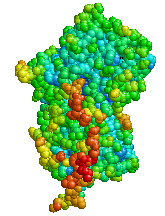
Photo from wikipedia
Alpha 1-antitrypsin (AAT) deficiency (AATD) is a genetic condition characterised by low serum levels of AAT and is associated with a high risk of developing early-onset pulmonary emphysema, especially in… Click to show full abstract
Alpha 1-antitrypsin (AAT) deficiency (AATD) is a genetic condition characterised by low serum levels of AAT and is associated with a high risk of developing early-onset pulmonary emphysema, especially in cigarette smokers [1]. The most common deficiency alleles among Caucasians are Pi*Z (Glu342Lys) and Pi*S (Glu264Val), and the majority of individuals with severe AATD are Pi type ZZ. According to available literature, PiZZ AATD comprises about 1–5% of all chronic obstructive pulmonary disease (COPD) cases [2]. Given the importance of the protease/anti-protease imbalance in causing Pi*Z-related emphysema [3], intravenous infusions of exogenous AAT are used as a specific augmentation therapy. Data from large interventional and observational studies suggest that decline in lung function and overall mortality decelerates in augmented compared to non-augmented patients [4]. Despite this therapy, it is impossible to halt the progression of emphysema in many patients and for those who develop end-stage lung disease, lung transplantation (LTx) remains the only option [5]. AATD is the fourth-most common reason for LTx, accounting for about 6% of all adult lung transplants [6]; however, there are only a few studies of post-LTx outcomes of patients with AATD [7, 8]. Evidence for the use of augmentation therapy after LTx is insufficient, and there is no consensus whether LTx recipients with AATD should receive augmentation therapy. According to the data, only 13–19% of AATD patients receive augmentation therapy after LTx [7]. Furthermore, the putative influence of previous augmentation therapy on lung recipients who discontinued this therapy following transplantation is entirely unknown. AATD patients who received augmentation therapy prior to LTx show worse survival rates http://ow.ly/tfgX30e5cVW
Journal Title: European Respiratory Journal
Year Published: 2017
Link to full text (if available)
Share on Social Media: Sign Up to like & get
recommendations!